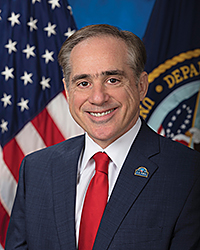 |
||||||||||||
|
Government Affairs, May/June 2017 Ten-Point Plans Abound BY PETE PETERSON, GOVERNMENT AFFAIRS CHAIR, AND STAFF When he was running to capture the presidency, Donald Trump heralded a 10-point plan that he said would enable veterans to get top-shelf medical care when and where they wanted. He also spoke of the need for far greater accountability in the VA, including firing employees who engage in behaviors that are corrupt or illegal. His VA Secretary, Dr. David Shulkin, an Obama administration holdover, has his own 10-point plan. It features an expanded concept of community care embracing non-VA clinicians where they are needed, and rejects any attempt at unfettered choice. One of Shulkin’s first moves to this end has been to extend the so-called Choice Act, which has just under one billion unspent dollars, beyond its August sunset. “We want to redesign the choice program so it actually works for veterans,” he told a gathering of veterans. “We know this program was way too complex. There were too many steps to go out and get the care they need.” Part of his Choice 2.0 redesign is to eliminate the 40 miles/30 days rules that are as inflexible as they are ill-conceived, along with new procedures for scheduling appointments and repaying private-sector physicians. He also wants to make “accountability” a watchword of his department. “When people lose their values, and deviate from the ethics and values we hold dearly, they no longer have the right to work in VA,” Shulkin said. Among his other points: infrastructure improvements, which undoubtedly include politically dicey consolidations and restructuring; enhanced “foundational services” that the VA does better than private sector medical facilities, specialties such as treating mental health disorders including PTSD and TBI, veteran-related research, and care and treatment for spinal cord injuries and amputations; breakthroughs in suicide prevention, which Shulkin has dubbed “our top clinical priority right now;” electronic medical record modernization; and far better coordination with DoD on health-related issues, something that has proven exceedingly difficult to achieve.
He has taken, with the backing of the president, a bold approach by making available mental health care services to veterans with administrative other-than-honorable discharges. “We are going to go and start providing mental health care to those with other-than-honorable discharges,” Shulkin told the House Committee on Veterans’ Affairs. “Our concern is those are some of the people that right now aren’t getting the services and contributing to this unbelievably unacceptable number of veteran suicides.” The unfortunate reality is that at least 22,000 servicemembers with bad paper have been unjustly released from the military because of mental health issues since 2009. Shulkin credited Rep. Mike Coffman (R-Colo.) for “changing my whole view of this.” Coffman, an Iraq War veteran, introduced legislation to force the VA to provide emergency mental health care to veterans with other-than-honorable discharges. Shulkin has launched what the VA is calling the Center for Compassionate Innovation (CCI), which will “explore emerging therapies that may enhance veterans’ physical and mental well-being,” according to a VA press release. In addition, the VA is seeking proposals “which may support those veterans who are unsuccessful with conventional treatment.” These proposals may be submitted through www.va.gov/healthpartnerships and are to be evaluated through “a rigorous algorithm that critically assesses the safety and efficacy of the innovation.” The new CCI also will explore innovative practices currently being tried on a small scale in the Veterans Health Administration, innovations that focus on PTSD, TBI, chronic pain, and suicide. CCI, according to the VA, “is strategically positioned to spotlight cutting-edge therapies and treatment modalities emerging in private industry.”
Over the course of a two-year session, members of Congress introduce thousands of pieces of legislation, including hundreds of bills that, for better or worse, affect veterans, dependents, and survivors—if they are enacted into law. While it is impractical even to attempt to track them all, some warrant our attention due to their relevance to issues about which we feel strongly. One is the Gary Deloney and John Olsen Toxic Exposure Declassification Act, introduced by Sens. Jerry Moran (R-Kans.) and Jon Tester (D-Mont.). Decades after they were carried out, an untold number of missions and projects in which troops were exposed to toxic elements remain classified by the Department of Defense. This prevents veterans from using their service records to establish a service-connected condition and gain eligibility for care and benefits. S. 726 would allow veterans exposed to toxic substances in classified incidents to gain access to their military records to apply for disability benefits and VA health care. The Helping Veterans Exposed to Burn Pits Act, introduced by Sen. Amy Klobuchar (D-Minn.), directs the VA to create a center of excellence in the prevention, diagnosis, mitigation, treatment, and rehabilitation of health conditions relating to exposure to burn pits and other environmental exposures in Afghanistan or Iraq. In the House, companion legislation, H.R. 1279, was dropped by Reps. Elizabeth Esty (D-Conn.), Ryan Costello (R-Pa.), Betty McCollum (D-Minn.), and Peter King (R-N.Y.). The essence of the Toxic Exposure Research Act, which was enacted in the last session of the last Congress, focuses on the potential health effects on the progeny of veterans of all eras who were exposed to toxic substances. Expanding and enacting S.319 to embrace veterans of all eras makes for a solid bookend to the research act. The Victims of Agent Orange Relief Act, introduced by Rep. Barbara Lee (D-Calif.), would dovetail with the Toxic Exposure Research Act by providing benefits to the children of male (currently only female) Vietnam veterans who are afflicted with certain birth defects. Much of the intent of this bill focuses on Vietnamese immigrants and Vietnamese who remain in Southeast Asia. It would direct the Department of Health and Human Services to make grants to appropriate public health organizations and Vietnamese-American organizations to conduct a broad health assessment of Vietnamese-Americans who may have been exposed to Agent Orange and their children or descendants. It also would establish centers in the United States in which large populations of Vietnamese-Americans reside to provide assessment, counseling, and treatment for conditions related to Agent Orange exposure. The Lawrence J. Hackett, Jr., Vietnam Veterans Agent Orange Fairness Act, introduced by Rep. John Katko (R-N.Y.), would direct the VA to establish a task force to make recommendations about the care and compensation that should be provided to veterans who have been exposed to Agent Orange, their spouses, and multiple generations of their offspring. Among the recommendations the task force would be charged with making would be the establishment of an Agent Orange Illness Compensation Program to provide an exposed veteran or eligible survivor a lump sum payment for the veteran’s injury, illness, or death; the establishment of a national outreach and education campaign about Agent Orange exposures and health conditions; and the establishment of a unified policy to deal with the consequences of exposure to hazardous materials in the military. The Blue Water Navy Vietnam Veterans Act, introduced by Rep. David Valadao (R-Calif.), would include as part of the Republic of Vietnam its territorial seas for purposes of the presumption of service connection for diseases associated with exposure by veterans to certain herbicides in Vietnam during the war. With 265 co-sponsors, one would think this bill would pass swiftly. But there are too many questions of cost. H.R. 1662, introduced by Subcommittee on Health Chairman Brad Wenstrup (R-Ohio), would prohibit smoking inside any Veterans Health Administration facility immediately and outside VHA facilities within five years. According to the VA, only 20 percent of veterans enrolled in the VHA are smokers. Many non-smoking veteran patients are at an increased risk for cardiovascular events associated with exposure to secondhand smoke. |
||||||||||||
|
|
||||||||||||
|
||||||||||||
8719 Colesville Road, Suite 100, Silver Spring. MD 20910 | www.vva.org | contact us |
||||||||||||





















 VA Secretary Shulkin has been rapidly putting his mark on his department, which in recent years has not been a paragon of change.
VA Secretary Shulkin has been rapidly putting his mark on his department, which in recent years has not been a paragon of change.